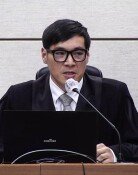Controversy over North Korean Nuclear Sales to Libya
Controversy over North Korean Nuclear Sales to Libya
Posted March. 21, 2005 22:38,
The Washington Post reported on March 20 that the U.S. government intentionally misled facts in the process of informing the Korean, Chinese and Japanese governments about North Koreas sale of a nuclear material, uranium-hexafluoride (UF 6), in early 2001 to Libya, which is causing a subtle stir.
The Korean government showed its careful attitude on March 21, saying that it would take time before handling the case.
What is the real information?-
The kernel of the report is that the North sold UF 6 to Libya through Pakistan, not directly to Libya, but that the George W. Bush administration didnt clearly explain Pakistans intermediary role to the three countries in order to press the North Korean government.
The Washington Post indicated that the U.S. government had deliberately omitted Pakistan in order to make it conspicuous that North Korea could help the emergence of a new nuclear-armed country (Libya) beyond cooperating with an existing nuclear-armed country (Pakistan), adding that the U.S. intended to protect its alliance partner, Pakistan.
The U.S. was reported to have made it clear that although it didnt clearly point out Pakistan, it obviously said the involvement of a global underground network immediately after the first report from the Washington Post on February 3.
The Washington Post actually quoted an official of the administration as saying that the sale could have been made through an underground network in Pakistan in its following report on February 4.
The White House was said to have replied that it made a clear explanation to its alliance partners while rejecting interviews from newspapers. What this means is that despite the information distortion on the part of the U.S., North Korea still crossed the red line of nuclear material exports.
Influence on the six-party talks-
This incident will very likely be a negative factor on the talks from the fact that information about the Norths nuclear weapons by the U.S. government could be selected information.
Some people already indicate that this information issue is a repetition of the last information distortion incident concerning the presence of weapons of mass destruction (WMD) in Iraq.
In addition, the U.S.s plan to form a five to one structure within the six-way talks facing the North could stumble, especially, if Korea and China do not trust the U.S.s information on the North Korean nuclear program.
Seung-Ryun Kim srkim@donga.com






![“설거지해도 그대로”…냄비 ‘무지개 얼룩’ 5분 해결법 [알쓸톡]](https://dimg.donga.com/c/138/175/90/1/wps/NEWS/IMAGE/2026/01/15/133164664.3.png)
